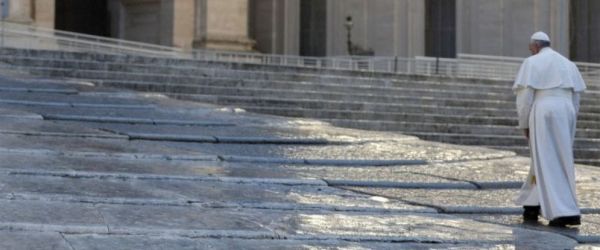Today’s Gospel passage (cf. Mk 10:35-45) describes Jesus who, once again and with great patience, tries to correct his disciples, converting them from the world’s mentality to that of God. The opportunity is given to him by the brothers James and John, two of the very first whom Jesus met and called to follow him. By now they have gone quite a long way with him and in fact belong to the group of the 12 Apostles. Therefore, while they are on their way to Jerusalem — where the disciples anxiously hope that on the occasion of the celebration of Passover, Jesus will at last establish the Kingdom of God — the two brothers take courage, approach the Teacher and make their request: “Grant us to sit, one at your right hand and one at your left, in your glory” (v. 37).
Jesus knows that James and John are inspired by great enthusiasm for him and for the cause of the Kingdom, but he also knows that their expectations and their zeal are tarnished by the spirit of the world. Thus he responds: “You do not know what your are asking” (v. 38). And as they are speaking of ‘thrones of glory’ on which to sit beside Christ the King, he speaks of a “cup” to be drunk, of a “baptism” to be received, that is, his passion and death. James and John, always aiming at the hoped-for privilege, say in an outburst: yes, “we are able”! (v. 39). But here too, they do not truly understand what they are saying. Jesus forewarns that they will drink his cup and receive his baptism, that is, that they too, like the other Apostles, will take part in his cross, when their time comes. However, Jesus concludes: “to sit at my right hand or at my left is not mine to grant, but it is for those for whom it has been prepared” (v. 40). As if to say: now follow me and learn how to love ‘at a loss’, and the heavenly Father will see to our reward. The way of love is always ‘at a loss’, because to love means to set aside egoism, self-referentiality, in order to serve others.
Jesus then realizes that the other 10 Apostles are angry with James and John, and thus show they have the same worldly mentality. And this offers him inspiration for a lesson that applies to Christians of all times, for us too. He says: “You know that those who are supposed to rule over the Gentiles lord it over them, and their great men exercise authority over them. But it shall not be so among you; but whoever would be great among you must be your servant, and whoever would be first among you must be slave of all” (vv. 42-44). It is the rule of Christians. The Teacher’s message is clear: while the great people of the Earth build themselves ‘thrones’ for their own power, God chooses an uncomfortable throne, the cross, from which to reign by giving his life: “the Son of man”, Jesus says, “also came not to be served but to serve, and to give his life as a ransom for many” (v. 45).
The way of service is the most effective antidote against the disease of seeking first place; it is the medicine for status seekers, this seeking first place, which infects many human contexts, and does not even spare Christians, the People of God, nor even the ecclesiastical hierarchy. Therefore, as disciples of Christ, let us receive this Gospel passage as a call to conversion, in order to witness with courage and generosity a Church that bows at the feet of the least, in order to serve them with love and simplicity. May the Virgin Mary, who fully and humbly adhered to the will of God, help us to joyfully follow Jesus on the way of service, the royal road that leads to Heaven.
[Pope Francis, Angelus 21 October 2018]












